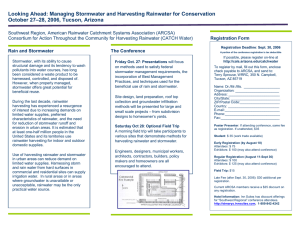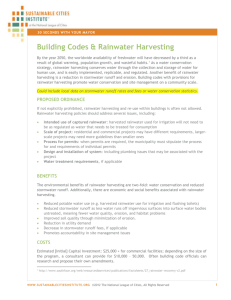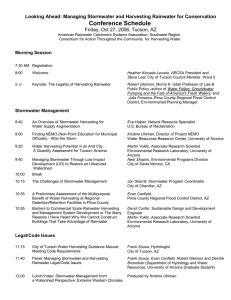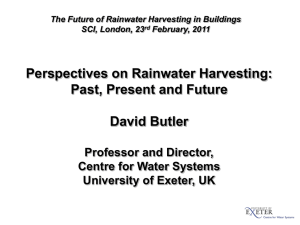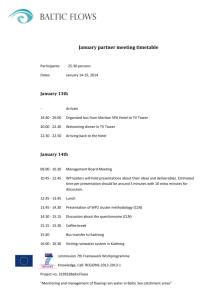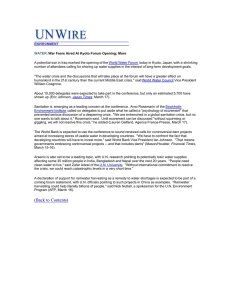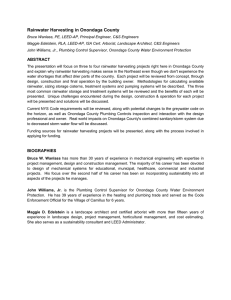Looking Ahead: Managing Stormwater and Harvesting Rainwater for Conservation
advertisement
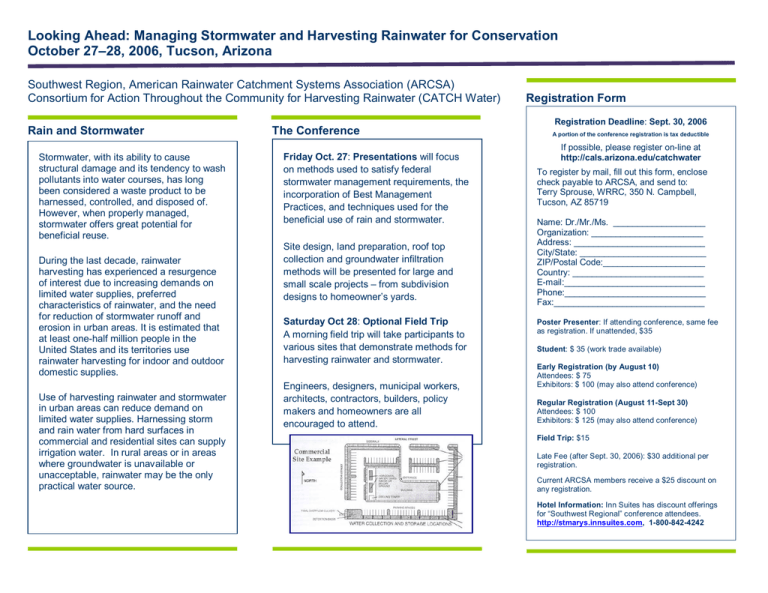
Looking Ahead: Managing Stormwater and Harvesting Rainwater for Conservation October 27–28, 2006, Tucson, Arizona Southwest Region, American Rainwater Catchment Systems Association (ARCSA) Consortium for Action Throughout the Community for Harvesting Rainwater (CATCH Water) Rain and Stormwater Stormwater, with its ability to cause structural damage and its tendency to wash pollutants into water courses, has long been considered a waste product to be harnessed, controlled, and disposed of. However, when properly managed, stormwater offers great potential for beneficial reuse. During the last decade, rainwater harvesting has experienced a resurgence of interest due to increasing demands on limited water supplies, preferred characteristics of rainwater, and the need for reduction of stormwater runoff and erosion in urban areas. It is estimated that at least one-half million people in the United States and its territories use rainwater harvesting for indoor and outdoor domestic supplies. Use of harvesting rainwater and stormwater in urban areas can reduce demand on limited water supplies. Harnessing storm and rain water from hard surfaces in commercial and residential sites can supply irrigation water. In rural areas or in areas where groundwater is unavailable or unacceptable, rainwater may be the only practical water source. The Conference Friday Oct. 27: Presentations will focus on methods used to satisfy federal stormwater management requirements, the incorporation of Best Management Practices, and techniques used for the beneficial use of rain and stormwater. Site design, land preparation, roof top collection and groundwater infiltration methods will be presented for large and small scale projects – from subdivision designs to homeowner’s yards. Saturday Oct 28: Optional Field Trip A morning field trip will take participants to various sites that demonstrate methods for harvesting rainwater and stormwater. Engineers, designers, municipal workers, architects, contractors, builders, policy makers and homeowners are all encouraged to attend. Registration Form Registration Deadline: Sept. 30, 2006 A portion of the conference registration is tax deductible If possible, please register on-line at http://cals.arizona.edu/catchwater To register by mail, fill out this form, enclose check payable to ARCSA, and send to: Terry Sprouse, WRRC, 350 N. Campbell, Tucson, AZ 85719 Name: Dr./Mr./Ms. ___________________ Organization: _______________________ Address: ___________________________ City/State: __________________________ ZIP/Postal Code:_____________________ Country: ___________________________ E-mail:_____________________________ Phone:_____________________________ Fax:_______________________________ Poster Presenter: If attending conference, same fee as registration. If unattended, $35 Student: $ 35 (work trade available) Early Registration (by August 10) Attendees: $ 75 Exhibitors: $ 100 (may also attend conference) Regular Registration (August 11-Sept 30) Attendees: $ 100 Exhibitors: $ 125 (may also attend conference) Field Trip: $15 Late Fee (after Sept. 30, 2006): $30 additional per registration. Current ARCSA members receive a $25 discount on any registration. Hotel Information: Inn Suites has discount offerings for “Southwest Regional” conference attendees. http://stmarys.innsuites.com, 1-800-842-4242 Southwest Region, ARCSA Cado Daily, SW Region Representative Looking Ahead Managing Stormwater and Harvesting Rainwater for Conservation Sponsors • • • • • The City of Tucson The Bureau of Reclamation ARCADIS The University of Arizona The U of A Water Resources Research Center October 27–28, 2006 Inn Suites - Tucson Center 475 N. Granada Tucson, Arizona ARCSA ARCSA was founded in Austin, Texas, in 1994 to promote the installation, development, and public awareness of rainwater harvesting systems in the United States. ARCSA is incorporated as a nonprofit, tax-exempt education organization. The objectives of ARCSA are— To promote rainwater catchment systems through meetings and conferences, To provide networking between people with experience in rainwater harvesting systems and those needing assistance in building such systems, To provide a forum for discussion of new methods, techniques, and materials pertaining to rainwater catchment systems, To develop informal publications to assist in the design and use of rainwater catchment systems, and To establish acceptable guidelines for constructing and operating rainwater harvesting systems. To join ARCSA, visit www.arcsa-usa.org SW ARCSA POB 622 Bisbee, AZ 85603 Members of ARCSA include rainwater systems manufacturers, installers, and suppliers; engineers; architects; builders; homeowners; rainwater harvesting advocates, and persons working in water utilities, governments, and academia. http://www.arcsa-usa.org
